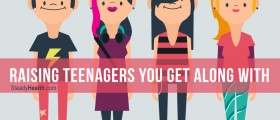
Teenagers can get severely affected by depression, regardless of the fact that their problems are often perceived as superficial melancholy or states of bad mood. Depression, when neglected or nourished, can evolve into something far more dangerous, such as suicidal tendencies, drug abuse, problems at home and at school or destructive aggressiveness.
Luckily, people around depressed teenagers can do a lot to help them get on the right track, since these young people need all the support they can get. Thus, pay attention to the symptoms of depression in teenagers and react timely once you notice these in someone you know.
Misconceptions Regarding Teenage Depression
Many people believe that teenagers are prone to depression since they are living a part of their lives which is prone to discoveries, disappointments and other emotionally strong experiences, perceiving this behavior as normal and temporary.
However, once burdened by depression manifesting through constant feeling of negativity and despair, teenagers find it hard to get on the right track, even after their teenage years are left behind them. In fact, 80% of all depressed teenagers never get the necessary help and support, struggling with this problem for many years to come.
Moreover, while adults seek help for their problems independently, teenagers need to rely on their families, teachers and other people around them for support and understanding. However, they usually remain silent and suffer. Thus, keep your eyes open for teenage depression, helping these young people get out of its clutches.
Symptoms of Teenage Depression
Reasonably, teenage moodiness is often mistaken for depression and vice versa. Additionally, depressed teens rarely display their sadness openly, making this problem harder to perceive and, thereby, prevent. On the other hand, rage, anger and other violent actions are more commonly practiced by depressed individuals in their teens.
Once you concentrate on your child's behavior a bit, you can notice if the changes affecting him/her are permanent or temporary. Then, you can react if you see that the child is truly suffering, being seriously emotionally hurt.
Possible Treatment
Once you decide to take action against your child's depression, you may face numerous possible ways of dealing with the problem. Either way, beforehand, you need to take the child to a psychologist. After examination, he/she will have an option of attending one-to-one or group therapy or will be treated with medications.
Keep medications as the last resort, since these are known to have many side-effects, being designed for fully developed, adult brains. Thus, teenagers taking antidepressants or other such medications may experience emotional and stress-related side-effects.

















Your thoughts on this
Loading...